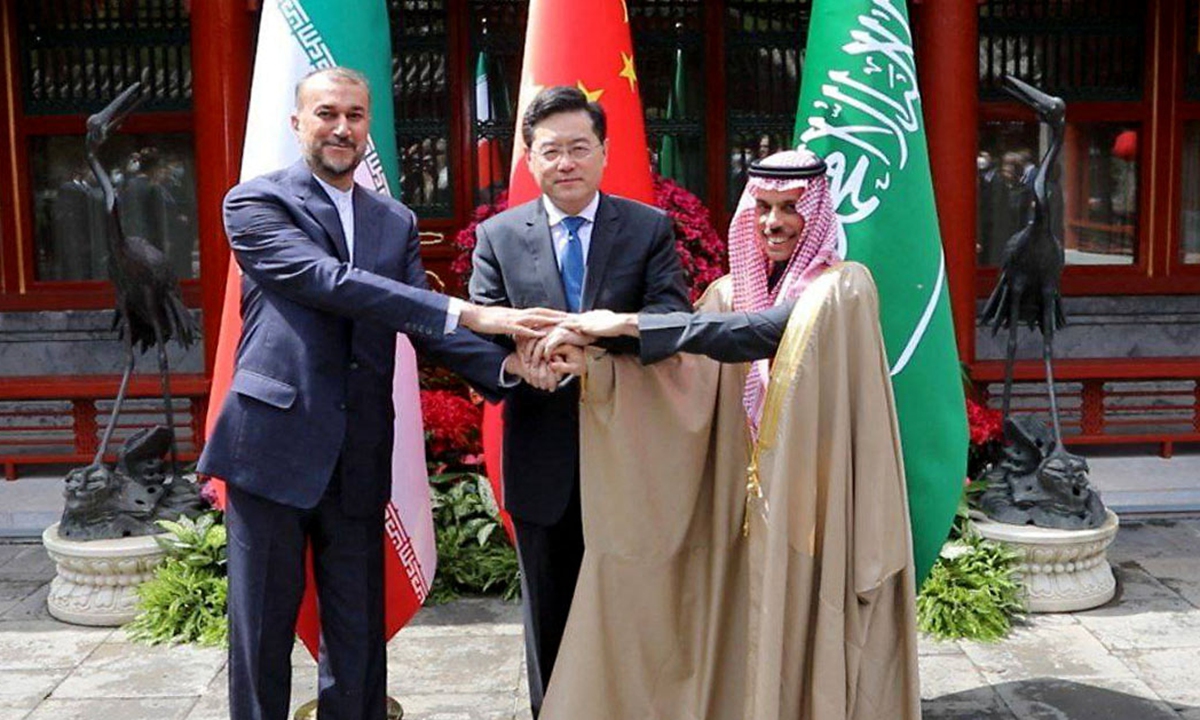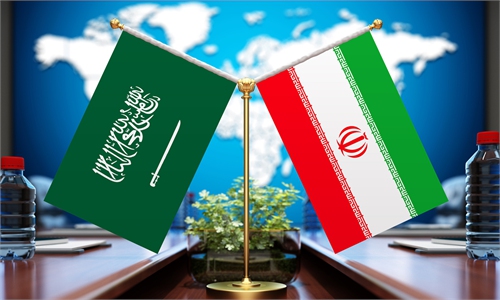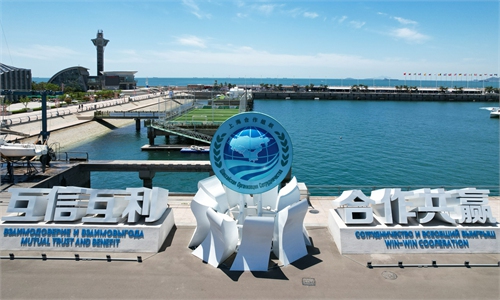Chinese FM witnesses resumption of Saudi Arabia-Iran diplomatic ties in Beijing
Reconciliation an example of resolving conflict via dialogue: Qin Gang

Chinese State Councilor and Minister of Foreign Affairs Qin Gang (center) shakes hands with Iran's Foreign Minister Hossein Amir-Abdollahian (left) and Saudi Foreign Affairs Minister Prince Faisal bin Farhan Al Saud on April 6, 2023. Photo:AFP
Saudi Arabia and Iran announced the resumption of diplomatic ties with immediate effect on Thursday in Beijing after the first formal meeting between the two countries' top diplomats in more than seven years. The amplification of China's mediation between the two countries has been remarkable over the past month, showing that the diplomatic philosophy advocated and practiced by China is being recognized worldwide, experts said.
Chinese State Councilor and Foreign Minister Qin Gang met with Saudi Arabian Foreign Minister Prince Faisal bin Farhan Al Saud and Iranian Foreign Minister Hossein Amir-Abdollahian in Beijing on Thursday, and witnessed the resumption of diplomatic relations between Saudi Arabia and Iran.
The two foreign ministers are in Beijing for a meeting. After the meeting, Qin witnessed the signing of a joint statement between Saudi Arabia and Iran. The two countries announced the resumption of diplomatic relations with immediate effect.
With the joint efforts of China, Saudi Arabia and Iran, the Saudi Arabia-Iran Talks in Beijing last month achieved significant results. Since then, the two sides have conducted sound high-level interactions and fully demonstrated their constructive attitude and sincerity, which China greatly appreciates, said Qin, adding that China supports the two sides in continuously taking new steps toward easing relations.
The improved ties between Saudi Arabia and Iran will help safeguard regional peace and stability, setting an example for the world to solve conflicts via dialogue as well as provide excellent practice of the Global Security Initiative and building a community with a shared future for humanity, Qin said.
The two top diplomats both expressed great appreciation for China's role in supporting Saudi Arabia and Iran to hold talks in Beijing.
The Thursday meeting in Beijing follows a landmark agreement brokered by China in March to restore diplomatic ties between Saudi Arabia and Iran, and reopen their respective embassies within two months.
The amplification and spillover effects of this major diplomatic event have been significant, Zhu Yongbiao, executive director of the Research Center for the Belt and Road at Lanzhou University, told the Global Times on Thursday. He noted that other Middle Eastern countries have been positively affected by the event and seen improved relations with other countries concerned, including the UAE and Syria.
It is a strong stimulant in a volatile and uncertain world, he said. Moreover, the multilateral and equal diplomatic relations that China advocates and practices are once again being recognized by other countries, Zhu said. It is at the same time an indication that US diplomacy, which maintains a Cold War mindset, is being abandoned by the world, he noted.
Saudi Arabia cut diplomatic ties with Iran in early 2016 in response to the attacks on Saudi diplomatic missions in the country after the kingdom executed a Shiite cleric. The fierce geopolitical competition surrounding the situations in Yemen, Syria, Lebanon and other countries have led to confrontation across the Middle East.
The world has hailed the China-brokered deal reached by Saudi Arabia and Iran in March, seeing it as a milestone in helping to deescalate tensions and restore peace in the Middle East as well as in injecting stability into a volatile geopolitical landscape. This showed that China's diplomatic philosophy, which aims to promote peace and development, is much more appealing than some countries' tactics of fueling confrontation to expand their own political domain in the Gulf region, experts noted.
Since the Arab Spring - a wave of protests, uprisings, and unrest that spread across Arabic-speaking countries in Middle East and North Africa - in 2011, confrontation and zero-sum game have become core features of international relations between countries in the Middle East, Liu Zhongmin, a professor at the Middle East Studies Institute of Shanghai International Studies University, told the Global Times.
Moreover, due to the impact of the West's past colonization, hegemony and power politics, the pattern in the Middle East has typically been characterized by conflict, leading to a vicious circle of security issues and lack of development, Liu noted.
China's successful mediation in the reconciliation of Saudi Arabia and Iran not only helps to promote the easing of tension in the Middle East, but also to change the regional political layout and a strategic culture characterized by confrontation. The idea and practice of peaceful development, coordinated talks, tolerance and learning from each other that China has been dedicated to promoting is becoming a common option for countries in the region and hopefully will help to promote the trend of easing tensions and development in the region, Liu stressed.
The concept of pursuing independent diplomacy has been on the rise in the Middle East region in recent years. China's diplomatic approach of non-interference in other country's internal affairs, not filling power vacuums or seeking hegemony while promoting dialogue and consultation to address issues is being well-received across the region, experts noted.
Saudi Arabia is planning to invite Syrian President Bashar al-Assad to an Arab League summit that Riyadh is hosting in May, Reuters reported Sunday citing some unnamed sources familiar with the issue. Assad's attendance at an Arab League summit, if realized, would mark the most significant development in his rehabilitation within the Arab world since 2011, when Syria was suspended from the organization.
A few days after the Saudi-Iran agreement in Beijing, two other regional rivals, Turkey and Egypt also started to send each other warm messages and spoke about re-establishing full diplomatic relations. Turkish Foreign Minister Mevlut Cavusoglu visited Cairo on March 18 to hold talks with his Egyptian counterpart Sameh Shoukry for the first time since bilateral relations were severed about a decade ago.



